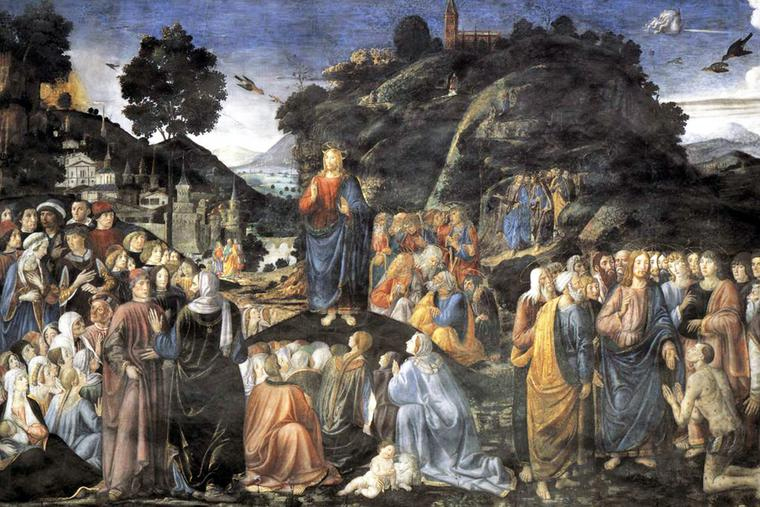Christian Art | Jesus Preaches | Jesus Christ Saves
Office Of Readings | Week 12, Monday, Ordinary Time | A Reading From The Treatise Of Saint Gregory Of Nyssa On Christian Perfection | The Christian Is Another Jesus Christ
‘The Christian is another Jesus Christ.’
Saint Gregory, one of the Cappadocian Fathers and a central figure in fourth-century theology, explores what it means to bear the name ‘Christian’. Drawing heavily from the writings of Saint Paul, he lays out a vision of spiritual transformation in which the believer becomes an ‘alter Christus’ – another Christ.
Patristic Context | The Mystery Of Christian Identity
Gregory’s vision is deeply rooted in the theology of the early Fathers. Like Saint Irenaeus before him, Gregory believes that the Son of God assumed human nature to recapitulate and renew it. As Irenaeus wrote: ‘He became what we are so that we might become what He is.’ This theme of transformation is central to Gregory’s anthropology. To be called ‘Christian’ is not a mere title but a call to conformity with Christ – a process involving the whole person: body, soul, and spirit.
Gregory’s brother, Saint Basil the Great, and their contemporary Saint Athanasius also affirmed this idea of deification (theosis): that through the grace of Christ, human beings are called to share in the divine life. Gregory’s contribution is to frame this mystical ascent in terms of moral and spiritual perfection.
Pauline Theology And Mystical Union
Saint Gregory’s commentary draws extensively on the letters of Saint Paul. The key passage, Galatians 2:20 – ‘It is no longer I who live, but Christ who lives in me’ – becomes a lens through which Gregory interprets the whole Christian vocation. Paul’s litany of Christological titles, referenced by Gregory, underlines the richness and depth of this identity: Jesus Christ is the image of God, our high priest, the new Adam, the rock, the head of the Church, and more.
In quoting Paul’s various descriptions of Jesus Christ, Gregory is not compiling a list but presenting a mosaic of divine excellence that the Christian is called to reflect. The title ‘Christian’ thus implies a share in the mystery of Christ’s own nature – not simply by imitation but by inner transformation through grace.
Christological Titles And Theological Significance
The array of titles applied to Christ – ‘peace’, ‘our Passover’, ‘the King of all,’ ‘the head of the Church’, etc. – reflects a high Christology. Each title encapsulates an aspect of the Saviour’s mission and mystery. These are not mere poetic expressions; they carry deep doctrinal meaning, each pointing to a truth affirmed by the early ecumenical councils.
- Mediator between God and man (cf. 1 Tim 2:5) emphasises Christ’s unique role in salvation.
- First-born of the dead (cf. Col 1:18) affirms His primacy in resurrection.
- King of peace (cf. Heb 7:2) echoes Melchizedek and points to Jesus Christ’s eternal priesthood.
These titles were also tools of catechesis, forming the faithful in an integrated understanding of who Christ is – as both divine and human, Redeemer and Revealer.
Theology Of Divine Names
In Gregory’s thought, as in that of Dionysius the Areopagite, divine names are not arbitrary labels but revelations of God’s nature. To be called ‘Christian’ is to share in these divine names – a theme that runs through Eastern Christian spirituality. To ‘bear the name’ is to enter into communion with the reality signified by that name.
Thus, when Gregory insists that ‘we must ensure that in us are seen all the meanings of the name of Christ,’ he is invoking the idea that names have performative power. This is why the Christian life must be conformed to the person and pattern of Christ – through love, humility, and holiness.
Christian Identity In History And Today
The name ‘Christian’ first applied to the followers of Jesus in Antioch (Acts 11:26), carried weight and cost in a world that often viewed them with suspicion or hostility. Gregory’s treatise continues this line of thought: Christian identity must be verified not merely in profession but in witness.
In contemporary theology, especially following Vatican II, the dignity of the baptised Christian has been re-emphasised. Documents such as Lumen Gentium speak of the universal call to holiness, echoing Gregory’s own emphasis. The Catechism of the Catholic Church teaches that baptism unites us to Christ’s death and resurrection and incorporates us into His Body.
To be a Christian, then, is to share in Christ’s anointing as prophet, priest, and king – a point strongly affirmed by modern sacramental theology.

A Reading From The Treatise Of Saint Gregory Of Nyssa On Christian Perfection | The Christian Is Another Jesus Christ
More than anyone, Saint Paul understood who Christ is and those requirements needed by the person named after him. Paul spoke of what he himself had accomplished and accurately imitated him in a manner to show the Lord expressed in his own person. By careful imitation Paul became a model so that it is no longer he who is perceived as living and speaking, but Christ who lives in him. Knowing his own blessings, that good man said You seek proof that Christ is speaking in me and, elsewhere, It is no longer I who live but Christ who lives in me.
Paul’s words show us the significance of Christ’s name, when he said that Christ is the power and wisdom of God. But he also called Christ: peace; the inaccessible light where God dwells; our sanctification and redemption; the great high priest; our Passover and our sacrifice of expiation; the brightness of glory; the very image of God’s substance; the creator of the ages; our spiritual food and drink; the rock and the water; the foundation of faith; the chief cornerstone; the image of the great and invisible God; the head of his body, the Church; the first-born of the new creation and the first-fruits of those who have fallen asleep; the first-born from the dead, the first-born among many brothers; the mediator between God and man; the only-begotten Son crowned with honour and glory; the Lord of glory; the beginning of all things; the King of justice, but not only of justice but also the King of peace and the King of all things, the King whose kingdom is boundless.
Paul gave all these names to Christ and many others too: so many that they cannot easily be counted. But they are all related, and if you understand the meaning of each of them on its own and put those meanings together then you will come to understand the full meaning of that one word ‘Christ’ and that will show you – as far as the human soul is able to comprehend it – God’s inexpressible greatness.
The good Lord has granted us the privilege of sharing in this, the greatest, most divine and chief of all names, so that, honoured by the name of Christ, we are called ‘Christians’. So then we must ensure that in us are seen all the meanings of the name of Christ, so that our title is not false and meaningless but is borne out by our lives.
Prayer With Jesus
Lord Jesus Christ,
You have called us to bear your name and to be transformed into your likeness. Help us to live in such a way that our words and actions proclaim you to the world. May we never dishonour the name ‘Christian’ but, through your grace, reflect your peace, wisdom, and love. Fill us with Your Spirit, that you may live in us and we in you, unto the glory of God the Father.
Amen.
Glossary Of Christian Terms
- Deification (Theosis): The process by which a Christian becomes more like God through grace.
- Christological Titles: Descriptions and names given to Jesus Christ that express His divine mission and nature.
- Galatians 2:20: A foundational Pauline verse expressing the believer’s mystical union with Christ.
- Name Theology: The theological tradition that understands divine names as revealing God’s nature.
- Catechesis: Instruction in the faith, especially preparing individuals for baptism and Christian life.
- Vatican II: The Second Vatican Council (1962–65), which renewed Catholic teaching on the Church, laity, and sacraments.
- Lumen Gentium: A key Vatican II document on the nature and mission of the Church.
- Imitation of Christ: The spiritual practice of conforming one’s life to the example and teachings of Jesus.








